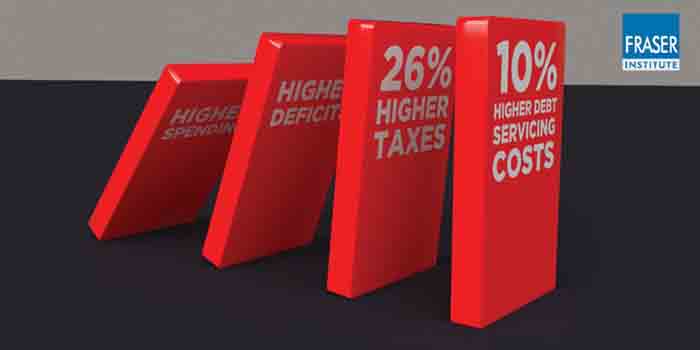By Fraser Institute ——Bio and Archives--May 2, 2023
Canadian News, Politics | CFP Comments | Reader Friendly | Subscribe | Email Us

CALGARY—Despite misperceptions that government deficits have no cost, higher deficit-financed spending by provincial governments over the past 50 years has led to higher taxes and higher debt-servicing costs, according to a new study released today by the Fraser Institute, an independent, non-partisan, Canadian public policy think-tank.
“Governments that run ongoing deficits ultimately have to face the fiscal music in the form of higher taxes and higher debt interest payments for future taxpayers,” said Ergete Ferede, a senior fellow at the Fraser Institute and co-author of How Provincial Governments Respond to Fiscal Shocks and Federal Transfers.
The study analyzes provincial government finances between 1966/67 and 2020/21 and finds that for every $1 increase in per-capita deficit-financed program spending, there was a corresponding increase in taxes of 26 cents and 10 cents in higher debt servicing costs in the future.
Moreover, an increase in current provincial spending is not entirely offset by future spending reductions. For every $1 increase in current per-capita deficit-financed program spending, future program spending only declined by 71 cents. Put differently, even when provincial governments run so-called “temporary” deficits due to increased spending, future taxpayers are still left with higher taxes and increased debt interest payments.
Crucially, over the same 55-year period, only three provinces—Alberta, Saskatchewan, and British Columbia—have, on average, had budget surpluses, while every other province has, on average, run deficits.
“The evidence is clear—despite the rhetoric, even temporary deficit-financed government programs impose significant future costs on taxpayers,” said Bev Dahlby, Fraser Institute senior fellow and study co-author.
Media Contact:
Ergete Ferede, Senior Fellow
Bev Dalhby, Senior Fellow
Jake Fuss, Director, Fiscal Studies
View Comments
The Fraser Institute is an independent Canadian public policy research and educational organization with offices in Vancouver, Calgary, Toronto, and Montreal and ties to a global network of 86 think-tanks. Its mission is to measure, study, and communicate the impact of competitive markets and government intervention on the welfare of individuals. To protect the Institute’s independence, it does not accept grants from governments or contracts for research. Visit fraserinstitute.org.
Follow the Fraser Institute on Twitter | Like us on Facebook